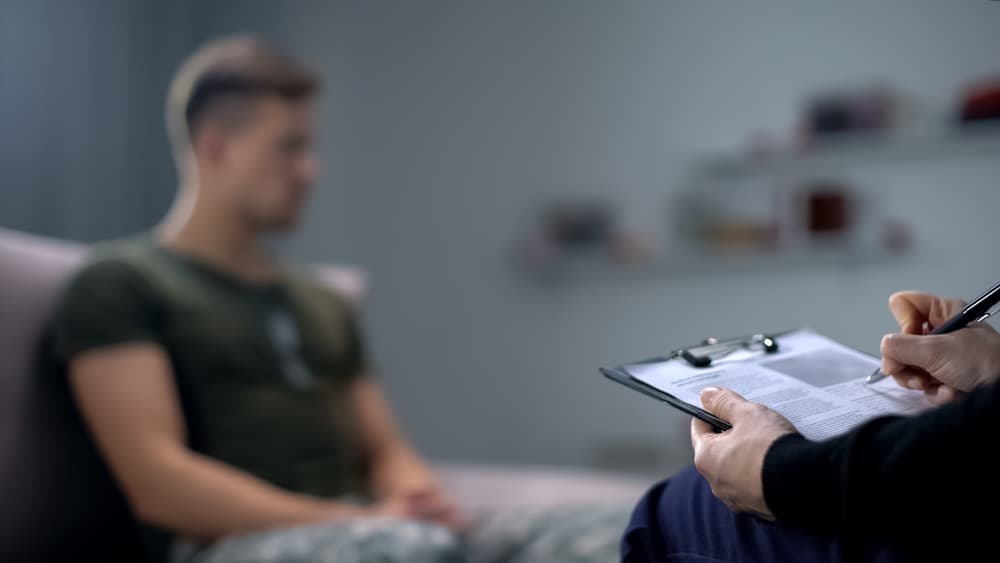
If you are one of the brave military members who chose to serve and protect our country, you were likely exposed to many traumatic events during your service. Whether you saw actual combat, witnessed a comrade being injured, or experienced someone’s death, some memories will be forever seared in your mind.
Many Veterans return from their tour of duty and face the symptoms and challenges of post traumatic stress disorder (PTSD). If you are wondering if you can recover from military PTSD after your service, the answer is yes.
While you can take some steps on your own, you may also benefit from working with a dedicated PTSD lawyer during your recovery. A skilled Veterans law firm can guide you through the recovery process and provide help when dealing with the VA.
Studies have shown that Veterans face the challenges of PTSD far more often than non-military people. In fact, military service members make up a high percentage of those dealing with PTSD. About 6 percent of people in the U.S. will develop PTSD in their lives, but Veterans are more likely to face PTSD than non-military citizens.
For example, research involving Veterans of Operations Iraqi Freedom and Enduring Freedom reveals that up to 29 percent will develop PTSD at some point in their lives. Also, those who saw combat have an even greater chance of facing PTSD. Overall, more tours of duty served and more combat experience will increase your likelihood of developing PTSD.
While some military members may show symptoms of PTSD shortly after a shocking or traumatic event, others do not face these challenges until they separate from service and try to reintegrate into civilian life.
Seeking PTSD treatment quickly can help in both of these situations, but the available care may differ.
For Veterans who have completed their service, it may take weeks or even years for PTSD to manifest.
Veterans who are no longer on active duty may report:
PTSD can manifest in many different ways, these are just some of the most commonly reported signs.
You can help yourself when you realize what is happening, and you can recover from military PTSD after your service concludes.
While you are on active duty, you can seek medical care directly from military providers. After completing your service, you can take several steps to overcome PTSD and emerge even stronger than before.
The Veterans Administration (VA) provides mental health services, and you may qualify for disability benefits if you can show a traumatic event during your military service caused your PTSD.
The VA can take time to process and approve your benefit application. Again, working with an experienced PTSD lawyer can make the process more efficient, so you can begin receiving treatment as soon as possible. Meanwhile, you can start your recovery.
Regular exercise will not only help keep you fit, but it also helps you reduce adrenaline surges, release feel-good endorphins, and helps to improve your mood. When you move, pay close attention to how your body feels. Pay attention to your movements and the thoughts that go through your head.
When you notice the rhythm of your feet striking the road during a run or a punching combination during a boxing workout, you might experience a more relaxed state of mind and inner calm.
Try to exercise outside, if possible. Nature has a way of bringing peace when you pay attention to everything around you.
If you feel anxious or out of control, some self-control exercises can calm yourself. One simple exercise is to count your breaths and slow every outgoing breath.
If a smell or sound triggers a wave of anxiety, think about ways to find comfort. If looking at family photos, smelling a certain scent, or petting a dog helps bring you to a better state of mind, keep those things near for times when you need a break. Set up a safe, private place where you can relax, meditate, listen to music, or otherwise unwind.
Spending time with trusted loved ones and friends can calm your system. You don’t have to talk or analyze your situation. Just be with someone who will listen and not judge you when you are ready to talk. Consider volunteering or working with a charity that promotes a cause that’s important to you.
You can also join a support group for Veterans with PTSD to hear other Vet’s stories and learn how they cope with PTSD. Remember, you don’t have to describe your experience in detail, you can share your feelings in general with people who understand and are willing to listen.
Often, Veterans who struggle with PTSD can’t sleep well, can’t concentrate, anger quickly, and live in a heightened state of awareness. These issues affect your overall health and you should not ignore them. Try to sleep at least seven to nine hours each night and start with a relaxation routine to prepare you for bed.
Many people with PTSD engage in extreme activities because when their adrenaline is pumping, they feel “normal.” Instead of participating in dangerous or unhealthy activities, learn how to relax through yoga, meditation, or other relaxation techniques. If you feel like you need to hit something, take up boxing or martial arts. Go for an intense run or do a few sets of pushups to release pent-up energy.
Feed your body healthy, nutritious foods, not fast foods that are high in fat, sugar, and processed ingredients.
Avoid nicotine, alcohol, and other drugs, especially if you use them to numb your symptoms or block out bad memories. These substances can actually make PTSD symptoms worse and cause a downward spiral, leading to more substance use and possibly abuse.
If a traumatic event during your military service caused your PTSD, you may request benefits from the VA.
The burdensome and complicated application process requires you to show evidence to prove your right to benefits for military-related PTSD.
When you partner with a dedicated Veterans benefits law firm, you stand a better chance of receiving the benefits and the disability rating you deserve the first time you apply. If the VA denied your benefits, you may appeal that decision. There’s no better time to work with a skilled VA benefit legal team than right now.
If you are one of the many Veterans challenged by PTSD after your military service, you are not alone. And you don’t need to face your future alone.
Trust the team at Berry Law to help you recover and obtain the benefits you deserve. We are Veterans serving Veterans since 1965. We understand what you are going through, and we’re here to face the next battle with you.
Call us at (888) 883-2483 or fill out our online contact form for a consultation with the dedicated and compassionate team at Berry Law today.

Our monthly newsletter features about important and up-to-date veterans' law news, keeping you informed about the changes that matter.